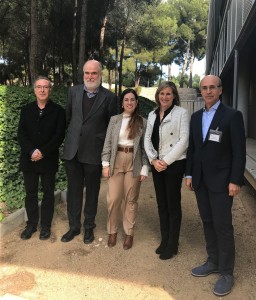Anna Mateo, PhD student under the supervision of Prof. Carles Bo (ICIQ), has defended her PhD Thesis entitled “Computational Studies of C-B Bond Formation Reactions” (assigned to the Department of Inorganic and Physical Chemistry of the Universitat Rovira i Virgili) publicly on November 8th at the ICIQ Auditorium.
The members of the examining committee were: Prof. Feliu Maseras (ICIQ), Prof. Ramón Sayós (University of Barcelona) and Prof. Carmen Barrientos (University of Valladolid).
Dr. Mateo is from Barcelona, she studied Chemistry and the Master in Industrial Chemistry and Introduction to Chemical Research from the Universitat Autònoma de Barcelona. She joined ICIQ in 2015 as a Life and Biosciences (ICIQ-LMU) fellow to pursue her PhD in computational chemistry. She likes reading and theatre – she’s a member of the amateur company “Amb Pinces.”
Why did you become a scientist? What do you want to achieve?
I became a scientist because when I was a kid, I played researchers –I wasn’t quite sure what that meant but it sounded fun. I was also good at math and science at school, so it was pretty clear I’d end up doing science. When I was a girl playing researchers, I wanted to change the world. Now, as a researcher, I still want to make it a better place, but maybe I’m not as ambitious as when I was younger. What I love about science and research is that I learn something every day, I truly enjoy it!
From the lessons learnt at ICIQ, which one do you value the most?
I appreciate talking with my supervisor, Carles Bo, who praised skills that I didn’t know I had. He was the one to tell me I have a visual eye – very convenient when preparing posters, presentations that other students might struggle with. There’s a wide range of skills that are useful for scientists and some fall out of the “traditional” scientific skills (or stereotypes).
What ICIQ moment you’ll never forget?
The computational groups at ICIQ always gather before Christmas to make the tió poop. It’s a great moment because we all gather together and the presents are knick-knacks so you never know what you’ll get – from chocolate to tissues, exciting!
What advice do you have for students who are starting their PhD now?
I’d tell them to be super-organized from the very beginning. It can be challenging but you need to be organized because later when you are writing the thesis, you need to condense all the information you’ve gathered in the four years you’ve been working and need to access the results from years ago.
Where are you going next?
I’m not sure yet, I’m starting to look for future opportunities.
If you were a lab instrument which would you be?
Since I’m a theoretician, I’d be a Graphical Interface because of its ease to help people and improve their experience – and also, it’s something that I’ve used plenty of times during my PhD.
